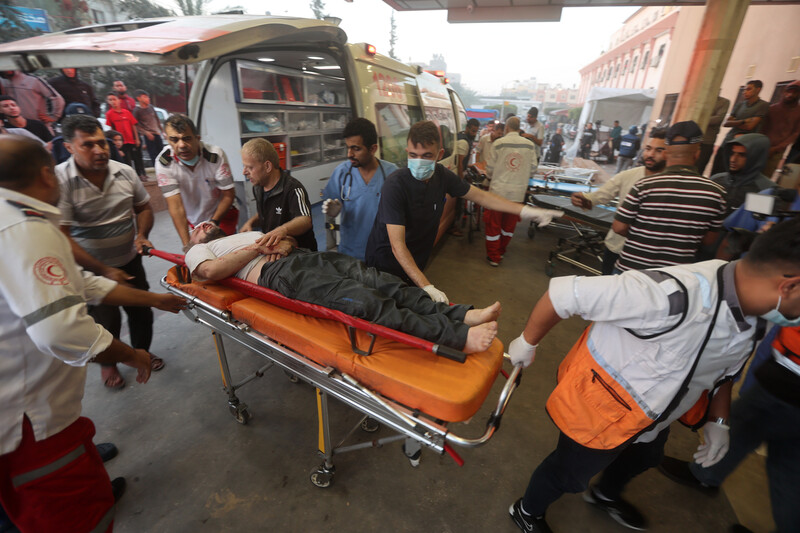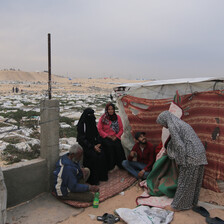The Electronic Intifada 27 December 2023

Paramedics are often in the firing line in Gaza, here bringing a wounded man to Nasser Medical Complex on 4 November.
ZUMAPRESSI met Muhammad Afana in September at Gaza City’s al-Shifa hospital.
Muhammad is a paramedic and we talked about the unique risks such work poses in Gaza, where Israel has proven time and again that its repeated and brutal assaults cause massive numbers of civilian casualties.
The 28-year-old had been a paramedic for nine years, when I spoke to him. During that time he witnessed three major Israeli aggressions – in 2014, 2021 and 2022 – countless minor ones, as well as the Great March of Return protests in 2018-19.
It is a period that saw the killing of nearly 1,900 civilians in Gaza, a number that now pales in comparison to the current genocide.
Paramedics have always been targets for Israel’s violence. In 2014, Amnesty International called for an international investigation into “mounting evidence” of “apparently deliberate targeting” of hospitals and health professionals in Gaza.
During the 18 months of the Great March of Return protests, health workers were similarly targeted. The period saw three fatalities and some 800 injuries to health professionals, prompting the Association of International Development Agencies – which comprises more than 80 international aid groups – to denounce Israel’s Gaza “blockade, repeated Israeli military offenses, and attacks on healthcare facilities and personnel [that] are carried out with impunity, without consequences, and without accountability.”
Attacks on Gaza’s medical sector were, in other words, common long before 7 October.
But this time, Israel’s attacks on the health sector are incomparable.
War on health
According to Medical Aid for Palestinians, Israel has killed at least 300 health professionals since 7 October, more than in all other conflicts in the world combined since 2016.
Dozens have been detained, including the heads of hospitals like Dr. Muhammad Abu Salmiya, al-Shifa’s director and Dr. Ahmed Muhanna, the head of al-Awda hospital in central Gaza.
Many, including Abu Salmiya, have not been heard from since their arrest. Such a “disappearance” is itself a war crime.
Israel also detained Muhammad Afana while he was transporting patients. He was reportedly released, but I haven’t been able to reach him or any of his friends or family since to check on him.
Muhammad has been a paramedic since 2014 when he finished his training at the Emergency Officers and Drivers Rehabilitation Institute in Gaza. His training was immediately put to the test when the 2014 war struck.
The first rule a paramedic is taught is “your safety first,” Muhammad told me back in September.
It is a rule paramedics regularly have to interpret in Gaza, he said.
“If we do not respond to calls because it is dangerous out there, we won’t be able to help anyone.”
Muhammad has had a number of close calls. During the Great March of Return, he was a member of the rescue team at the field trauma stabilization point close to the buffer zones along Gaza’s eastern boundaries.
Once, when the “shooting was crazy, indiscriminate and everywhere,” he remembered, everyone panicked. “Everyone started to run. I fell 12 meters down a hill. I woke up in the hospital.”
One night, a colleague right next to him was shot in the leg.
Duties at home and at work
In 2021, an ambulance in which Muhammad was riding was shelled while attempting a rescue near Al-Aqsa TV station.
Some 112 ambulances were damaged in Israeli attacks over the period of the Great March of Return protest from March 2018 until December 2019.
While Muhammad in September said the period of the Great March of Return was the worst he could remember, it has been completely overshadowed by the current situation. Since 7 October, more than 100 ambulances have been attacked and put out of service.
Israel openly targets ambulances now, in addition to hospitals and healthcare personnel. There is no respect for international law or any concern for the protection of health professionals.
The risk is so extreme that wounded and besieged people are often left without anyone to turn to as paramedics are unable to reach them.Muhammad is a father of three – two daughters and a son – and lives in a family building where his parents also reside. During times of conflict, he told me, he may spend four or five days away from home before being able to return for a shower or a change of clothes.
His family’s constant worrying results in frequent calls, though he can only respond to a few.
During such periods, he would normally work a 24-hour shift followed by two days rest. Often, however, the intense need for paramedics means they are prevented from going home.
In addition, there is a sense of duty.
Gruesome scenes
He remembers vividly a call he received at the beginning of the 2021 escalation after a house was bombed.
“A family of a girl and her parents were barbecuing in their yard. It was difficult to reach them,” he said. “The man and his daughter were killed. A 1,000 liter water tank had crushed them. Only the mother survived, but she was severely injured.”
The 2014 assault was also brutal. There was a shortage of ambulances during the Shujaiya massacre in Gaza City, when people were forced to evacuate at night.
“The evacuation continued from 10 pm to 2 am with people running around in panic. We transported them to UNRWA schools in the al-Nasr neighborhood. We saved as many as we could but unfortunately, many lives were lost.”
Gruesome scenes persist in Muhammad’s mind. These include the horrific 2021 bombing near the Maldive Gaza café, where Muhammad and his team’s main task was to collect unidentifiable body parts, burying them in unmarked coffins.
During “calmer” times, Muhammad worked at al-Wafa hospital, a facility for rehabilitation and elderly care.
It was Gaza’s only nursing home. It had been rebuilt after being destroyed in the 2014 attacks on the Shujaiya neighborhood.
The new building, however, was bombed again on 17 November this year, killing its director Medhat Muhesien and many elderly residents there.
Gaza is not safe for anyone now.
Certainly not for Muhammad or the heroic paramedics he works with, always to be found on the front lines in their efforts to save lives, and regularly targeted by Israel’s genocidal violence.
Sewar Elejla was formerly a doctor at al-Shifa hospital in Gaza. She is now a Canada-based researcher.





